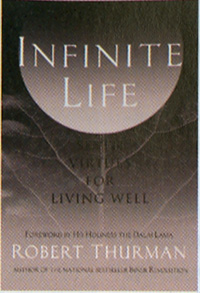
Infinite Life:
Seven Virtues for Living Well
Robert Thurman
New York: Riverhead, 2004
304 pp.; $24.95 (cloth)
With Infinite Life, Robert Thurman, the charismatic and controversial Tibetan Buddhist scholar, offers what may become his most influential book to date. Probably because he’s taught Buddhism to college students for so long, Thurman has a knack for using metaphors from Western culture to explain Buddhist concepts. When inviting readers to embrace the notion of immortality—a hard sell even to many longtime practitioners—Thurman refers to the popular movie The Matrix. He likens himself to Morpheus, the rebel leader who offers Neo, the latest recruit in the battle to free humanity, a fresh perspective on life:
Neo must choose between a red pill, which allows him to discover the truth, and a blue pill, which will return him to his ignorant, imprisoning, yet familiar reality. Like Morpheus, I am offering you a new way of looking at the world. Will you take the red pill or the blue pill? Will you choose to expand your concept of reality? Or will you choose to be “safe,” to continue to live with your preconceived notions despite the fact that they may be false and thus will radically constrict your ability to improve your situation and that of those around you?
Of course, most of us who pick up a book by Robert Thurman will find ourselves eyeing the red pill. After all, we’re not unfamiliar with the concepts of karma and reincarnation. It’s rather comforting, actually, to see ourselves as constantly evolving—everlasting works-in-progress. And who wouldn’t choose a reality that promises unlimited heights of spiritual bliss, understanding, love, happiness, and creativity, from here to eternity?
Just as we confidently reach for the red pill, Thurman/Morpheus issues a stern warning: “Embracing infinite life means embracing infinite interconnection with all other beings.” For us to be truly enlightened and happy, all other beings must also experience happiness. No sooner have we left the Matrix than Thurman tosses another metaphor into the mix—the creed of the Three Musketeers: “All for one and one for all.” Infinite life means infinite responsibility.
So maybe we still want that red pill, but we can’t help pausing, as we ponder the weight of “infinite responsibility.” By now we have figured out that the red pill contains the essence of the bodhisattva’s life, dedicated to the welfare and liberation of all beings. This kind of talk can be intimidating. Are we willing to embrace a reality where every action has infinite consequences for ourselves and others? And how on earth can we alleviate the suffering of all beings when we can barely handle our own?
This is where Thurman’s genius—and thirty-five-plus years of Tibetan Buddhist practice—come into play. For the rest of the book he shows readers exactly how to integrate infinite responsibility into daily life. His teachings rest on the paramitas, or transcendent virtues: wisdom, generosity, patience, contemplation, plus what he terms “justice” (sila, usually translated as “discipline”) and “creativity” (virya, usually “energy” or “diligence”). Thurman adds a “seventh transcendence”: art (as in “the art of infinite living”). He introduces each virtue in an eloquent preamble, then sets out the challenges of mastering it and suggests meditations to develop it. In the chapter on justice, for instance, he exhorts readers to “look unflinchingly” at the horrible suffering in the world while at the same time declaring it unacceptable for such terrible things to happen. In this meditative state of refusal we send out “tendrils of connectedness, setting up a morphic resonance with other minds and hearts that this must not stand. . . . We must intervene.” Each chapter closes with personal and collective action to support the virtue at hand. He suggests, for example, that we examine our government’s “prideful and self-centered isolationist worldview”—a quintessentially Thurmanesque take on the present U.S. administration, whose policies he has publicly decried.
After the release of Inner Revolution (1998), purists scolded Thurman for melding Buddhism with his political agenda. But his strongly Western identity, his outspokenness, and his willingness to kick up some dust are the qualities that define Thurman’s approach. Buoyed by unbridled optimism, he is unafraid to take a spiritual stand, whether against the occupation of Tibet, the malfeasance of America’s leaders, or the inertia that keeps us locked in the concept of a separate self. With this book, Thurmann dares us all to swallow the daunting red pill.
Thank you for subscribing to Tricycle! As a nonprofit, we depend on readers like you to keep Buddhist teachings and practices widely available.